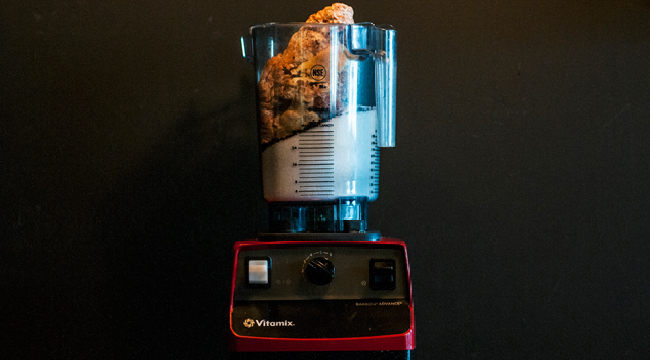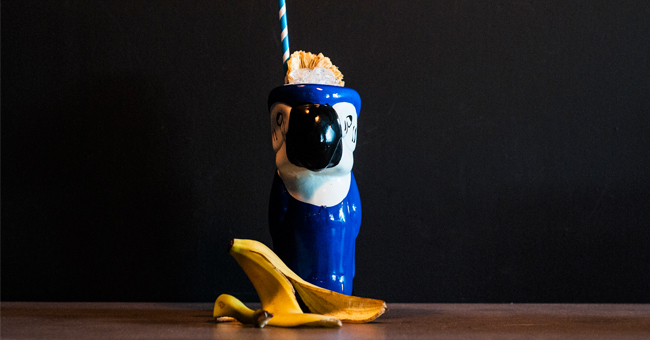“Zero-waste,” “sustainable,” “green” — these words have all come up in industry conversation, especially in the last year. But at the operational level, what do they actually mean for bars? Getting rid of perishables completely or eliminating ice from your entire bar program is innovative and inspiring, but these measures aren’t realistic for most establishments. What is doable, though, is cutting back on how much you throw away each night — especially if you can repurpose that would-be waste in a drink.
That’s the basic premise behind Trash Tiki, a self-funded platform from Iain Griffiths and Kelsey Ramage (also of White Lyan and Dandelyan), who’ve taken to rummaging through the rubbish bin for inspiration. The side project will bring the duo into bars around the world for pop-up educational events to show bartenders how they can, with a bit of creativity, repurpose ingredients that would otherwise be tossed in the garbage: orgeat made from stale almond croissants; rum infused with avocado pits; a clever way to use spent lime lime husks in a citrus agent.
“This is not zero waste — what this is, is shining an extra large spotlight on that dark little corner of the bar where we hide the bin. Because in bars right now we’re throwing out more flavor than we’re ever possibly using in one night,” says Ramage. “And even if you are being as waste efficient as possible, guess what? The restaurant next door, almost certainly isn’t, so go use their trash and make your program even more impactful!”
 Iain Griffiths and Kelsey Ramage, the duo behind Trash Tiki (who also work at London’s White Lyan and Dandelyan). (Photo: Elliott Davies)
Iain Griffiths and Kelsey Ramage, the duo behind Trash Tiki (who also work at London’s White Lyan and Dandelyan). (Photo: Elliott Davies)
That “restaurant next door” idea is exactly what led to Trash Tiki’s very unique orgeat recipe. The syrup, a staple of tiki programs, usually involves almonds, sugar and floral distillates like rosewater or orange flower water. Trash Tiki’s iteration involves a trip to the bakery down the street for a couple of stale almond croissants on their way to the trash. “It really underpins this idea of looking outside your own four walls to find new flavors. We’re taking almond croissants due to be tossed and a bit of spent coffee grains from the cafe down the road, vat for a night with sugar and water, then blitz, strain and bottle. The recipe is wide open for bars to customize and means literal hundreds, if not thousands, fewer glass bottles being shipped around the world if bars take up on this idea.”
Another recipe the pair have developed involves old lime peels, which plenty of bars toss out every single night. Those peels, however, have enough flavorful, aromatic oils on their own, so Trash Tiki repurposed them into a lime flavoring agent they call “pink citrus.” Not only does the recipe make use of what would otherwise get tossed; it also eliminates the need to squeeze a fresh lime each time you need to add citrus to a drink. Even the lowly avocado pit (which we’ve spotted before as a stand-in for ice) gets put to work in an infusion: “when grated, toasted and quickly infused into some rum, it adds colour, texture and aroma in a complex manner that most bars would go through five extra steps and three different ingredients to achieve the same result,” says Griffiths.
“Trash Tiki is about addressing consumption: not via guilting people for what they have bought, but getting them informed on every possible potential use an ingredient has once they do purchase it with simple recipes that high volume to speakeasy can nail, tweak to make their own and start making bank on what they were otherwise gonna bag up and throw away,” says Ramage.
For Ramage and Griffiths, that’s how modern bartenders can make real change happen in the industry’s collective environmental impact: not by completely overhauling your entire operation to fit more sustainable practices, but by taking baby steps, like squeezing a little extra use out of the random bits of debris, residue and trimmings that bars throw away each and every night. The duo plans to start out with a focus on the industry, with upcoming stops scheduled in LA, Singapore, Helsinki and Paris. Their premise for spreading the word, they say, is really quite simple: “These guys make tasty drinks from trash and play loads of punk. Should be a good night out!”
 The duo’s unconventional orgeat recipe involves snagging a few stale almond croissants that a bakery might toss at the end of the day. (Photo: Elliott Davies)
The duo’s unconventional orgeat recipe involves snagging a few stale almond croissants that a bakery might toss at the end of the day. (Photo: Elliott Davies)
Trash Tiki’s Almond Croissant Orgeat:
-
- 1 kg Boiling Water
- 1 kg Granulated Sugar
- 1 Almond Croissant: just hit up your local cafe and ask them to not throw out what they don’t sell. You want these for the sugar and the butter/oil so ain’t no thing if they’re a day or two old by the time you use them
- 1 Heaped Bar spoon (5g) of Spent Coffee Grains: again, hit up your cafe and ask them to save what they got. Cold brew is better for this as you tend to have more oil left in the grains as well as the aroma and flavor being more delicate. If you can only find espresso than depending on final flavour, you may want to use half as much.
- 100ml white rum
Vat sugar, water and croissants and store covered for a minimum of 12 hours. Stir occasionally. Add coffee and rum, then blitz with stick blender or Vitamix until croissants are fully blended. Filter: we use super bags as they’re reusable and when you got lots of prep happening at once, you can just hang ’em up over a tub and walk away. Store in air-tight container and refrigerate.





